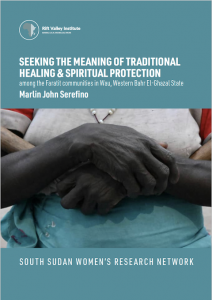South Sudan’s healthcare system faces significant challenges, particularly in rural areas where access to clinical services is limited and costly. Many South Sudanese turn to traditional healers who use herbal medicines and spiritual methods due to a lack of affordable clinical care and mistrust of formal medical facilities. Recognizing the importance of these traditional practices, this study in Wau, Western Bahr el Ghazal, explores why and how people use traditional healers alongside or instead of clinical services. Focusing on the Faratit communities, it delves into beliefs around sickness, the role of ancestral spirits, and the perspectives on traditional and spiritual healers. Conducted between November 2022 and January 2023, the research involves interviews and focus group discussions with various community members, providing insights into the enduring significance of traditional healing practices in South Sudan.
ABOUT THE AUTHOR
Marlin John Serefino John is an oral history researcher and graduate of Peace and Conflict Studies from the Catholic University of South Sudan. She also has a diploma in Computer and Secretarial Practice from Don Bosco Institute in Wau. Marlin has conducted research on climate change and climate justice issues in South Sudan with the Rift Valley Institute’s Research Community of Practice (RCoP) project. Marlin received mentorship under this project from Dr Cherry Leonardi from Durham University, UK.
SOUTH SUDAN WOMEN’S RESEARCH NETWORK
This report is a product of the EU funded South Sudan Women’s Research Network (SSWRN), which provides research grants, training and mentorship to early career female researchers in South Sudan. The project aims to ensure that women’s perspectives are included in the research and decision-making on development issues in the country.




